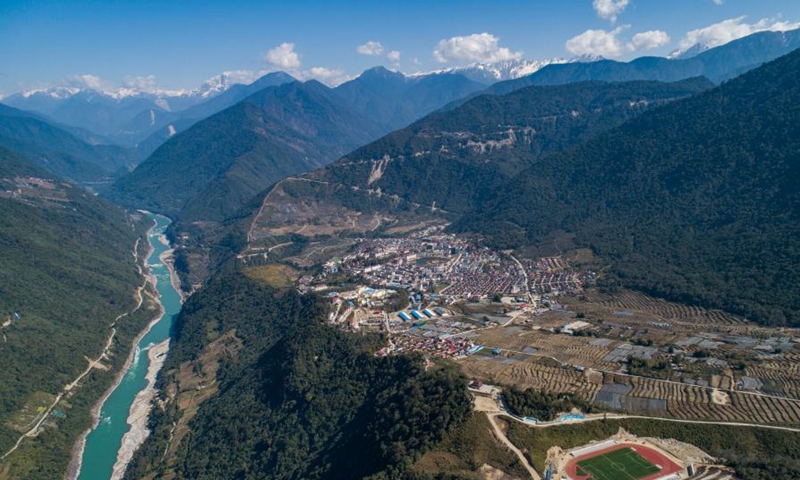
Aerial photo taken on Feb. 13, 2021 shows the view of Yarlung Zangbo River and Medog County in Nyingchi City of southwest China's Tibet Autonomous Region. (Xinhua/Sun Fei)
The just concluded two sessions of China have passed the proposals for formulating its 14th Five-Year Plan and future targets for 2035, setting tone for the prospect of the world's second largest economy. Among dozens of plans in the proposal version, one has drawn wide attention - forming a hydropower development plan on the Yarlung Zangbo River.
It is not the first time the plan has been raised, while along years of considering and planning, there has been constant ill-intended hype heating up by foreign media outlets and politicians, especially from the downstream nation of India, claiming that China's plan to develop hydropower of the river was akin to "hydro-hegemony" and will harm the interest of India.
The concern is simply unfounded. Put aside that it is China's legitimate right to carry out hydropower station development of the river; the nation has always held a responsible attitude towards the development and utilization of cross-border rivers and adopted the policy of simultaneously developing and protecting cross-border rivers.
Not only that both interests of upstream and downstream areas will be taken into consideration, the Chinese people welcome hydrological cooperation with riparian states based on mutual beneficial principles.
As a well-known infrastructure giant, China has advanced technology and sufficient capital. The development of hydropower in the Yarlung Zangbo River, which is rich in hydro-energy reserves, is crucial to easing the tension of electricity supply in central Tibet, environmental protection, as well as social and economic development in the region. The promotion of the development project on the Yarlung Zangbo River has been determined.
Behind the project, it is local area's economic development demand and residents' right to pursue a better livelihood, especially when China has embarked its journey to build a modern socialist country in all respects.
It's foreseeable that the ill-intentioned foreign forces will not quit vilifying the vital economic infrastructure, but India's concern is unnecessary. There's plenty space for riparian nations to cooperate within, such as flood reporting and control, disaster relief, and emergency management.
In fact, these are areas that China, India and Bangladesh have already joined hands on. And along the following promotion of the project on Yarlung Zangbo River, China will uphold an open and genuine attitude to working with related parties to address concerns and differences.
As for the media outlets and politicians in India who are intent on politicizing every topic when it comes to China in exchange for political benefit, a better path for them is to drop the detrimental and short-sighted hype, and focus more on how to enhance cooperation with China and bring in more benefits to all the people along the river.




